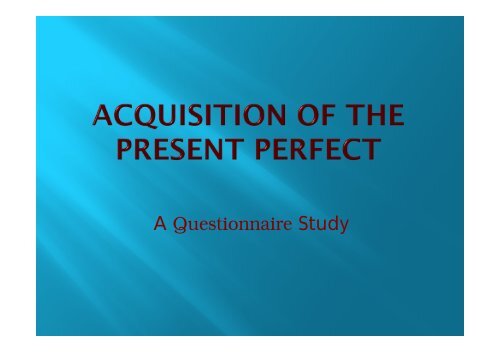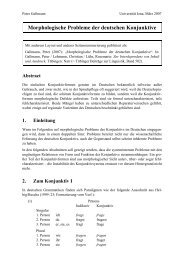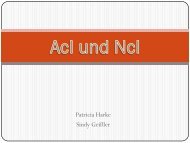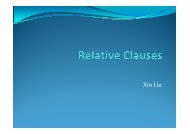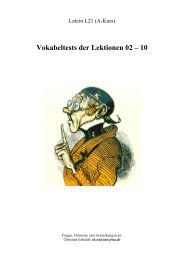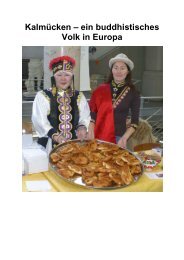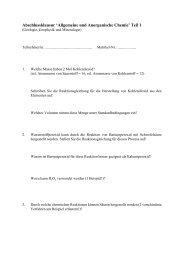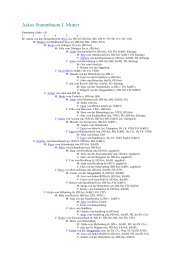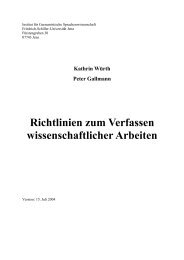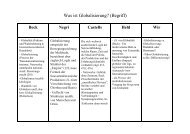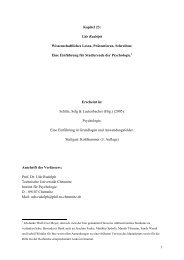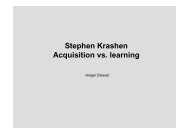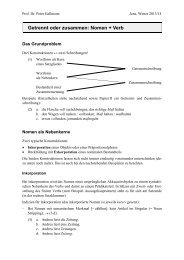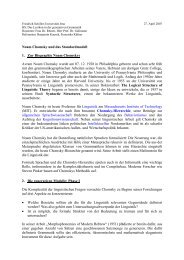Alexandra Gathen: L2 acquisition of the English present perfect
Alexandra Gathen: L2 acquisition of the English present perfect
Alexandra Gathen: L2 acquisition of the English present perfect
You also want an ePaper? Increase the reach of your titles
YUMPU automatically turns print PDFs into web optimized ePapers that Google loves.
A Questionnaire Study
1. Rationale<br />
2. Hypo<strong>the</strong>ses<br />
3. Stimuli – The Questionnaire<br />
4. Coding System<br />
5. Population<br />
6. Data<br />
7. Preliminary Results
For different groups <strong>of</strong> learners <strong>of</strong> <strong>English</strong>, researchers have already<br />
commented on <strong>the</strong> possibility that <strong>the</strong> mo<strong>the</strong>r tongue may have an<br />
influence on <strong>the</strong> overuse <strong>of</strong> <strong>the</strong> <strong>present</strong> <strong>perfect</strong> in contexts where <strong>the</strong><br />
simple past/preterite would be <strong>the</strong> appropriate tense (cf. Ayoun and<br />
Salaberry 2008: 560 f., Collins 2002: 49, Rohde 1997: 39).<br />
For <strong>the</strong> German language, various grammarians describe difficulties<br />
that may be caused by <strong>the</strong> similar form <strong>of</strong> <strong>the</strong> German Perfekt and<br />
<strong>the</strong> <strong>English</strong> <strong>present</strong> <strong>perfect</strong> next to some overlapping and some<br />
completely contrasting functions (cf. König and Gast 2009: 86 ff.,<br />
Sammon 2006: 47, among o<strong>the</strong>rs).<br />
However, <strong>the</strong>re have not been adequate studies with German learners<br />
<strong>of</strong> <strong>English</strong> so far to investigate <strong>the</strong> influence <strong>of</strong> <strong>the</strong> L1 on <strong>the</strong><br />
<strong>acquisition</strong> <strong>of</strong> <strong>the</strong> <strong>present</strong> <strong>perfect</strong>.
The NL influences <strong>the</strong> <strong>acquisition</strong> <strong>of</strong> <strong>the</strong> <strong>English</strong> <strong>present</strong> <strong>perfect</strong><br />
by native speakers <strong>of</strong> German, i.e. transfer occurs.<br />
1a. The NL influence can cause facilitation in cases where <strong>the</strong><br />
functions overlap.<br />
1b. The NL influence can cause interference in form <strong>of</strong><br />
proactive inhibition in cases where <strong>the</strong><br />
functions contrast.<br />
1c. The frequency <strong>of</strong> <strong>the</strong> use <strong>of</strong> <strong>present</strong> <strong>perfect</strong> instead <strong>of</strong><br />
simple past depends on <strong>the</strong> lexical aspect <strong>of</strong> <strong>the</strong> verb.<br />
1d. The frequency <strong>of</strong> <strong>the</strong> use <strong>of</strong> <strong>present</strong> <strong>perfect</strong> instead <strong>of</strong><br />
simple past depends on <strong>the</strong> learner’s pr<strong>of</strong>iciency with verb<br />
morphology, i.e. <strong>L2</strong> development.
• Selection <strong>of</strong> data:<br />
Written questionnaire by e-mail<br />
Sent to family and friends with very different language<br />
learning backgrounds<br />
• 30 copies sent out – got back 17 complete ones<br />
• Structure:<br />
- Introduction<br />
- Items on Social Data<br />
- Items on Language Data separated into 4 parts
Introduction:
Social Data:
Acceptability Judgement task:<br />
Translation task:
Gap filling task:<br />
Choice task:
• Number <strong>of</strong> Items: 42<br />
6 for social data, 36 for language data<br />
• Language-related items:<br />
29 in <strong>English</strong> language, 7 in German language<br />
• Independent variables:<br />
Language, Lexical aspect, Grammatical aspect, Relevant<br />
Verb context, Negation, Predicted kind <strong>of</strong> use, Possible NLinfluence<br />
• Dependent variables:<br />
Years <strong>of</strong> Learning, Time spent abroad, Need to speak last<br />
year, Tense, Correct use <strong>of</strong> tense, Grammaticality<br />
judgment, Accordance with my prediction
social data<br />
Gender<br />
Age<br />
Way <strong>of</strong> Learning<br />
Years <strong>of</strong> Learning<br />
Time spent abroad<br />
Need to speak in last year<br />
1 = female<br />
2 = male<br />
number<br />
1 = classroom<br />
2 = natural environment<br />
1 = 1-8<br />
2 = 9-15<br />
3 = > 15<br />
1 = never<br />
2 = < 3 months<br />
3 = 1/4 - 1 year<br />
4 = > 1 year<br />
1 = never or rarely<br />
2 = sometimes<br />
3 = <strong>of</strong>ten<br />
4 = very <strong>of</strong>ten
Independent Variables:<br />
Language<br />
Lexical aspect<br />
Grammatical aspect<br />
Relevant verb context<br />
1 = German<br />
2 = <strong>English</strong><br />
1 = state<br />
2 = activity/process<br />
3 = achievement<br />
4 = semelfactive<br />
5 = accomplishment<br />
1 = im<strong>perfect</strong>ive (ongoing, unfinished)<br />
2 = <strong>perfect</strong>ive (complete, finished)<br />
3 = both possible<br />
1 = adverb/adverbial <strong>of</strong> time<br />
2 = adverb/adverbial <strong>of</strong> place<br />
3 = adverb/adverbial <strong>of</strong> frequency<br />
4 = adverbial <strong>of</strong> duration<br />
5 = implied<br />
6 = o<strong>the</strong>r<br />
7 = none
Independent Variables:<br />
Negation<br />
Predicted kind <strong>of</strong> use<br />
Possible NL-influence<br />
1 = positive<br />
2 = negated<br />
1 = continuative/universal<br />
2 = existential<br />
3 = resultative<br />
4 = hot news<br />
5 = narrative<br />
6 = o<strong>the</strong>r<br />
7 = unclear<br />
1 = none<br />
2= unclear<br />
3 = facilitation<br />
4 = interference
Dependent Variables:<br />
Tense<br />
Correct use <strong>of</strong> tense<br />
Grammaticality judgement<br />
Accordance with my prediction<br />
1 = <strong>present</strong> <strong>perfect</strong><br />
2 = preterite<br />
3 = simple <strong>present</strong> or <strong>present</strong> progressive<br />
4 = none or o<strong>the</strong>r<br />
5 = more than one<br />
1 = incorrect<br />
2 = unclear<br />
3 = partly<br />
4 = correct<br />
1 = ungrammatical<br />
2 = grammatical<br />
1 = different<br />
2 = concurrent
• 17 participants:<br />
12 female, 5 male<br />
• all learned <strong>English</strong> in a classroom environment<br />
• min. age: 20, max. age: 50,<br />
mean age: 26,41<br />
Years <strong>of</strong> Learning<br />
Index Value Absolute frequency Relative frequency (%)<br />
1 1-8 2 11,76<br />
2 9-15 11 64,71<br />
3 > 15 4 23,53<br />
Sum 17 100,00
Time spent abroad<br />
Index Value Absolute frequency Relative frequency (%)<br />
1 never 3 17,65<br />
2 < 3 months 7 41,18<br />
3 1/4 - 1 year 5 29,41<br />
4 > 1 year 2 11,76<br />
Sum 17 100,00<br />
Need to speak last year<br />
Index Value Absolute frequency Relative frequency (%)<br />
1 never or rarely 3 17,65<br />
2 sometimes 5 29,41<br />
3 <strong>of</strong>ten 6 35,29<br />
4 very <strong>of</strong>ten 3 17,65<br />
Sum 17 100,00
Overview Depedent Data:<br />
Lexical Aspect<br />
Index Value<br />
Relative<br />
Absolute frequency frequency (%)<br />
1 state 8 22,22<br />
2 activity/process 8 22,22<br />
3 achievement 9 25,00<br />
4 semelfactive 4 11,11<br />
5 accomplishment 7 19,44<br />
Sum 36 100,00
Overview Depedent Data:<br />
Relevant verb context<br />
Index Value Absolute frequency Relative frequency (%)<br />
1 adverb/ial <strong>of</strong> time 10 27,78<br />
3 adverb/ial <strong>of</strong> frequency 1 2,78<br />
4 adverbial <strong>of</strong> duration 6 16,67<br />
5 implied 8 22,22<br />
6 o<strong>the</strong>r 4 11,11<br />
7 none 7 19,44<br />
Sum 36 100,00
Overview Depedent Data:<br />
Predicted kind <strong>of</strong> use<br />
Index Value Absolute frequency Relative frequency (%)<br />
1 continuative/universal 7 19,44<br />
2 existential 4 11,11<br />
3 resultative 9 25,00<br />
4 hot news 4 11,11<br />
5 narrative 9 25,00<br />
6 o<strong>the</strong>r 3 8,33<br />
Sum 36 100,00
Overview Depedent Data:<br />
Possible NL-influence<br />
Index Value Absolute frequency Relative frequency (%)<br />
1 none 8 22,22<br />
2 unclear 8 22,22<br />
3 facilitation 7 19,44<br />
4 interference 13 36,11
100,00<br />
Tense_mainly preterite<br />
90,00<br />
Relative Frequency in %<br />
80,00<br />
70,00<br />
60,00<br />
50,00<br />
40,00<br />
30,00<br />
20,00<br />
Item A_4<br />
Item A_7<br />
Item A_11<br />
Item B_1<br />
Item C_3<br />
Item C_4<br />
Item D_5<br />
10,00<br />
0,00<br />
<strong>present</strong> <strong>perfect</strong> preterite both
100,00<br />
Accordance with Predictions_preterite<br />
Relative Frequency in %<br />
90,00<br />
80,00<br />
70,00<br />
60,00<br />
50,00<br />
40,00<br />
30,00<br />
20,00<br />
10,00<br />
Item A_4a<br />
Item A_7<br />
Item A_11b<br />
Item B_1<br />
Item C_3<br />
Item C_4<br />
Item D_5<br />
0,00<br />
different<br />
concurrent
Preterite preference goes toge<strong>the</strong>r with:<br />
- Lexical aspect:<br />
accomplishment (2), activity/process, achievement (2),<br />
semelfactive (2)<br />
- Relevant verb context:<br />
adverb/ial <strong>of</strong> time (4), question word when (2)<br />
- Predicted kind <strong>of</strong> use:<br />
narrative (4)
100,00<br />
Items where only <strong>present</strong> <strong>perfect</strong> would be<br />
grammatically correct<br />
90,00<br />
Relative Frequency in %<br />
80,00<br />
70,00<br />
60,00<br />
50,00<br />
40,00<br />
30,00<br />
20,00<br />
Item A_6<br />
Item A_12<br />
Item A_15<br />
Item B_3<br />
Item C_2<br />
Item C_5<br />
Item C_7<br />
Item D_2<br />
Item D_6<br />
10,00<br />
0,00<br />
<strong>present</strong> <strong>perfect</strong> preterite <strong>present</strong> none/o<strong>the</strong>r both
Goes toge<strong>the</strong>r with:<br />
- A_6: activity/process, adverbial <strong>of</strong> duration, continuative/universal<br />
- A_12: semelfactive, hot news<br />
- A_15: state, adverb/ial <strong>of</strong> frequency, existential<br />
- B_3: state, adverbial <strong>of</strong> duration, continuative/universal<br />
- C_2: state, continuative/universal<br />
- C_5: activity/process, adverbial <strong>of</strong> duration, continuative/universal<br />
- C_7: achievement, adverbial <strong>of</strong> duration, existential<br />
- D_2: state, adverb/ial <strong>of</strong> time, continuative/universal<br />
- D_6: achievement, resultative
−<br />
−<br />
−<br />
−<br />
−<br />
In German, <strong>present</strong> <strong>perfect</strong> and preterite are used interchangeable<br />
in narrative contexts<br />
Adverbs/Adverbials <strong>of</strong> time, frequency, or duration <strong>of</strong>ten have a<br />
higher influence than <strong>the</strong> NL<br />
The main interference occurs with <strong>the</strong> continuative/universal use<br />
where Präsens is used in German<br />
The resultative use in <strong>English</strong> seems to have a low influence on<br />
German learners‘ choice <strong>of</strong> tense, even though it seems to be a<br />
strong predictor for Perfekt in German<br />
The hot-news use in <strong>English</strong> also seems to have a low influence on<br />
<strong>the</strong> choice <strong>of</strong> tense


